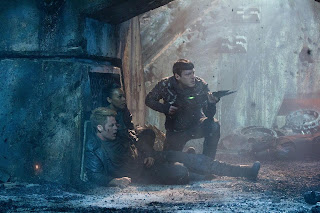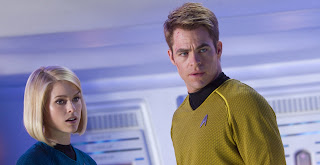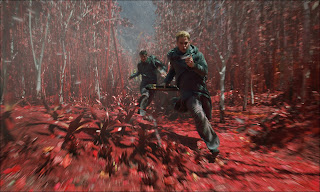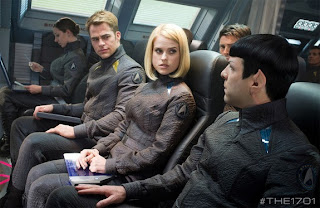I never like to think of
myself as a killjoy, but I have to admit that I didn’t actually enjoy the most
recent Star Trek film. Or rather, I
did enjoy it, but I didn’t enjoy it as a Star
Trek movie, and that makes me sad.
As a matter of fact, the
movie I think is most similar to classic Star
Trek, the ethos espoused by Gene Roddenberry, is actually Pacific Rim. And I’m not just saying
that because I really really liked it. Even though I did really really like it.
As I’m sure you all can tell.
But no, I have better
reasons than that, as well as reasons why, despite the eminent watchability of Star Trek: Into Darkness, I do not think
it was a good movie. Or rather, not a good Star
Trek movie. I’ve got a fair number of reasons for thinking this, but
there’s really only one that’s super important.
Hope.
Star Trek
was always about hope. Roddenberry was very clear about that. In Star Trek, we see a gleaming future for
mankind. We’ve gotten our crap together. We’ve stopped trying to kill each
other. We’re past the point of worrying about disease or race or gender, and
now we’re on a mission not to colonize the world around us, but to learn about
it. To explore. To boldly go.
I’m not saying this is the
most realistic prediction in the world, because it’s not. I would even go so
far as to argue that the sheer unreality of this future is what makes it
important. Just because it’s nearly impossible to imagine a future where we’ve
moved on as a species and we are being all we can be, doesn’t mean we
shouldn’t. It means we should try even harder to envision that bright day.
Star Trek
gave us an ideal future, where the best and brightest of our planet, regardless
of race or gender or physical fitness, were sent out to the stars not to
conquer or rule but to learn and explore and tell stories about what they
found. I love Star Trek because this
is what I want us to aspire to. And I didn’t like Into Darkness because it seems like we forgot that.
For those of you who didn’t see
Star Trek: Into Darkness in theaters,
here’s a brief recap. The film followed the events of the 2009 Star Trek movie, which as you may recall
rebooted the franchise. In this installment we catch up with the USS Enterprise
and her crew as they are exploring and carrying out missions for Starfleet. The
film starts with Kirk (Chris Pine) and Spock (Zachary Quinto) accidentally
causing mayhem and breaking the prime directive (not to interfere with any life
they find out there in space), and being called by to Starfleet Command to be
punished.
Kirk gets demoted down from
being Captain of the Enterprise, and Spock gets reassigned, and as an audience
you’re actually quite curious about where the story will go from here.
And then Khan shows up,
played by Benedict Cumberbatch, and he blows up a Starfleet archive, then
attacks the heads of Starfleet, and it’s all gunfights and violence and
explosions for a while.
Which was entertaining, I
guess, but it was really, well, weird.
 |
| Star Trek with guns? What? |
For sure, Khan has always
been a violent character. But the thing is, that was the point of his
character. Khan was a relic of an earlier, more brutal age. By the time we
reach Starfleet, people don’t really deal with violence on a day to day basis
anymore. You can see this in the simple fact that in old Trek, the security officers don’t have guns, they have phasers.
Phasers set to stun. Violence happens, but it’s always shown to be shocking and
unnecessary.
So it was a little weird to
see a gunfight in a Star Trek movie.
But moving on. Khan runs away to another planet, and Kirk goes on a mission of
revenge after him, intending to blow the guy to kingdom come with all of the
kajillion missiles he brings along. Then the story sort of goes from there.
Carol Marcus makes an appearance, played by Alice Eve, and shows off her boobs,
which is unnecessary and tonally dissonant. Uhura (Zoe Saldana) and Spock
needlessly debate their relationship during work hours, which flies in the face
of both of their prior characterizations. Admiral Marcus is hyper-violent and
intent on causing a war. Khan is white. Blegh.
Suffice to say that the
movie, entertaining though it was, kept making my heart sad for a very simple
reason. It wasn’t a Star Trek movie.
Oh, it wore the clothes and said the words, but this wasn’t a movie about
humanity at its best. This was a movie about violence and destruction, and it
was a movie that did not sufficiently explain why those things are bad.
So, cut to Pacific Rim. Like I said before, this is
a movie that actually is about people banding together, putting aside their
differences, and fighting for the good of humanity. Its characters truly care
about people and each other. The violence is not unnecessary or gratuitous;
it’s about human survival. It’s about hope.
The characters represent us
at our best as well. One of the major problems I had with Into Darkness was their marginalization of one of the key
principles of old Star Trek, the
inclusion of people of different races and genders into the upper echelons of
power. With the decision to make Khan white (in the original story he is from
Pakistan, and in the old series he was played by a Hispanic actor, Ricardo
Montalban, because it was significant to make a genetically superior being have
brown skin), the film neutered itself. It became about white men arguing with
other white men.
It wasn’t just about the
racial politics, either. In the old series, Uhura (Nichelle Nichols, who helped
create the role) was notable for her independence and professionalism. In Into Darkness, Uhura is defined by her
relationship to a white male lead, Spock, and only ever referred to in that
context. Her professionalism is removed, and her agency is diminished to the
point of non-existence. The only other female character in the film, Carol Marcus,
is reduced to a spate of daddy issues, made a vessel for uncomfortable
flirting, and needlessly ogled in her underwear.
Contrast, again, with Pacific Rim, where the two main female
characters are both fighters who make their own choices, and have those choices
respected. Where the command structure of the Jaeger program is not only not
wholly white and male, there’s only one white guy in the command team. The real
leaders of the program are all people of color, men and women.
But really what bothered me
was the hope. Into Darkness, it didn’t
feel like a movie about hope. It felt cold, almost. Cynical. It seemed to say
that the impossible dream of a world where Starfleet cares more about learning
than fighting is a silly thing to hope for. That we as people will always turn
towards our basest instincts. And that may be true. But. I’d rather not believe
it.
I would rather watch Pacific Rim. I choose to hope, and I don’t
care if that hope is stupid or unrealistic. I’m pretty sure that without my
hope the world would suck a lot more. We have to hope for something better, you
see. Because if we don’t, then we say that it’s okay. That the violence and the
frustration, and the grossness of humanity as we are are okay. They’re good
enough. They’re the best we can do.
I would rather hope for better.
 |
| Don't even get me started on this scene. |




One of my favorite things about "Pacific Rim" was the fact that the two leads never kissed. There was never a gratuitous face smashy togethery scene, especially at the end. I really enjoyed it and it made their relationship or friendship, whichever it may be, feel more real. And the fact that I'm still not sure if they love each other or are just very good friends is another tally in the "pro" column for me.
ReplyDeleteDude yes. And it was so much more emotionally impactful that way! Just, love. I love this movie. Love love love love love.
DeleteI think you nailed it with this one (I mean, you could convince me to wear a pizza on my head and call it a hat a la Kelly Kapowski, but that's just because you're awesome). I love Trek, and I was having trouble articulating why this movie felt a bit off, besides the race and gender stuff (which was SO OBVIOUS to me. How did the producers not see it?). Thank you!
ReplyDeleteI'm a little afraid that the producers did see it, and just didn't care. Which is kind of terrifying...
DeletePS, you're awesome and I'm going to refer to this blog as a pizza hat from now on.